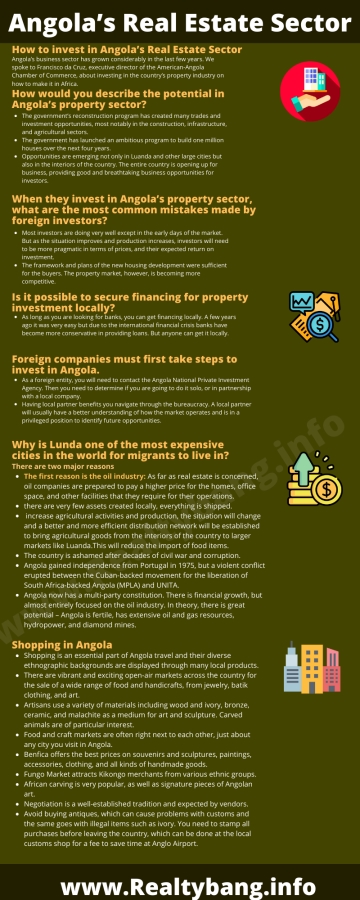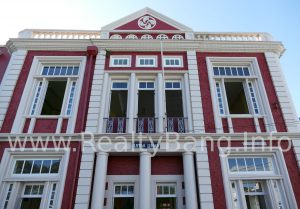How to invest in Angola’s Real Estate Sector: Angola’s business sector has grown considerably in the last few years. We spoke to Francisco da Cruz, executive director of the American-Angola Chamber of Commerce, about investing in the country’s property industry on how to make it in Africa.
How would you describe the potential in Angola’s property sector?
In the last eight years, the Angolan economy has been booming as a result of peace and stability in the country and a better macroeconomic situation.
The government’s reconstruction program has created many trades and investment opportunities, most notably in the construction, infrastructure, and agricultural sectors.
The development has in some ways raised large loans that the government has secured from China to invest in infrastructure rehabilitation. So we have seen the rehabilitation of roads, railways, and bridges, thus increasing the free flow of country and goods.
The government has launched an ambitious program to build one million houses over the next four years.
During the more than three decades that ended the war, no investment was made in real estate development, and now there is a major shortage in the housing and office space markets.
Opportunities are emerging not only in Luanda and other large cities but also in the interiors of the country. The entire country is opening up for business, providing good and breathtaking business opportunities for investors.
When they invest in Angola’s property sector, what are the most common mistakes made by foreign investors?
Most investors are doing very well except in the early days of the market. But as the situation improves and production increases, investors will need to be more pragmatic in terms of prices, and their expected return on investment.
Units could sell in development for a few years before construction began. The framework and plans of the new housing development were sufficient for the buyers. The property market, however, is becoming more competitive.
Is it possible to secure financing for property investment locally?
As long as you are looking for banks, you can get financing locally. A few years ago it was very easy but due to the international financial crisis, banks have become more conservative in providing loans. But anyone can get it locally.

How to invest in Angola’s Real Estate Sector?
Foreign companies must first take steps to invest in Angola.
As a foreign entity, you will need to contact the Angola National Private Investment Agency. Then you need to determine if you are going to do it solo, or in partnership with a local company.
Having a local partner benefits you from navigating through the bureaucracy. A local partner will usually have a better understanding of how the market operates and is in a privileged position to identify future opportunities.
Why is Lunda one of the most expensive cities in the world for migrants to live in?
There are two major reasons for that. The first reason is the oil industry. As far as real estate is concerned, oil companies are prepared to pay a higher price for the homes, office space, and other facilities that they require for their operations.
Furthermore, there are very few assets created locally, everything is shipped. This is placing the responsibility on availability in the market.
When we increase agricultural activities and production, the situation will change and a better and more efficient distribution network will be established to bring agricultural goods from the interiors of the country to larger markets like Luanda.
This will reduce the import of food items from countries such as South Africa, Portugal, and Brazil.
Angola is located between Namibia, one of the world’s poorest countries, and the Democratic Republic of Congo. The country is ashamed after decades of civil war and corruption.
Angola gained independence from Portugal in 1975, but a violent conflict erupted between the Cuban-backed movement for the liberation of South Africa-backed Angola (MPLA) and UNITA (National Association for the Total Independence) America drowned.
The civil war lasted for 27 years. The MPLA emerged as a strong party and exchanged Marxist-Leninism for social democracy in the 1990s.
Since 1979, the country has been ruled by Jose Eduardo dos Santos of MPLA. In 2002, with the death of UNITA leader Jonas Savimbi, the ceasefire was finally agreed upon and UNITA was disqualified.
Angola now has a multi-party constitution. There is financial growth, but almost entirely focused on the oil industry. In theory, there is great potential – Angola is fertile and has extensive oil and gas resources, hydropower, and diamond mines.
However, efforts to attract foreign investment have corruption and an inefficient judicial system, leading to increased investment risk.
Shopping in Angola
Shopping is an essential part of Angola travel and their diverse ethnographic backgrounds are displayed through many local products.
There are vibrant and exciting open-air markets across the country for the sale of a wide range of food and handicrafts, from jewelry, batik clothing, and art.
Artisans use a variety of materials including wood and ivory, bronze, ceramic, and malachite as a medium for art and sculpture. Carved animals are of particular interest.
Food and craft markets are often right next to each other, in just about any city you visit in Angola. In Luanda, there are two major regions – Benefica and Futungo. Benfica offers the best prices on souvenirs and sculptures, paintings, accessories, clothing, and all kinds of handmade goods.
Fungo Market attracts Kikongo merchants from various ethnic groups. The market is open on Sundays and is located in the southern part of the city. African carving is very popular, as well as signature pieces of Angolan art.
Negotiation is a well-established tradition and is expected by vendors, so don’t be shy to ask for a more reasonable price.
Avoid buying antiques, which can cause problems with customs and the same goes with illegal items such as ivory. You need to stamp all purchases before leaving the country, which can be done at the local customs shop for a fee to save time at Anglo Airport.




